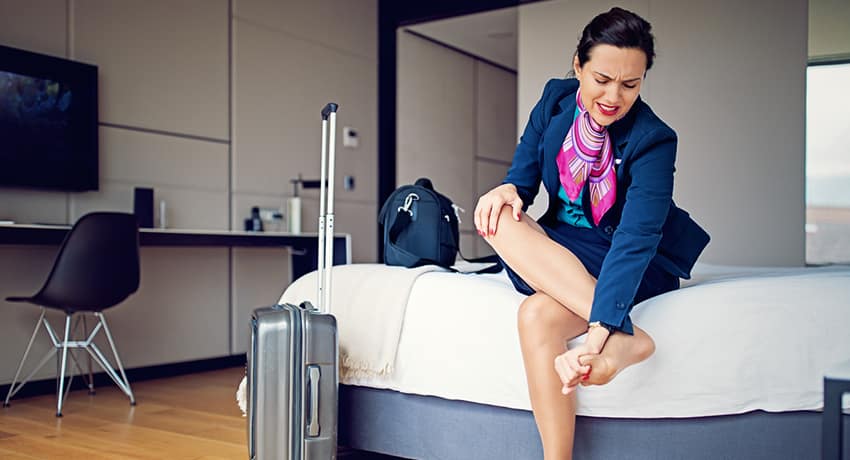Whether you find yourself on a flight or a long car ride to visit family, compression garments for the legs can help prevent swelling, potential blood clots, and the general discomfort that comes from extended travel.
“During the holiday season, many people ask about the risks of deep vein thrombosis (DVT) and pulmonary

embolism associated with travel,” said Bruce Tjaden Jr., MD, assistant professor with the Department of Cardiothoracic and Vascular Surgery at McGovern Medical School at The University of Texas Health Science Center at Houston (UTHealth). “In general, my advice is – if you experience swelling or discomfort when traveling, you may want to consider compression socks.”
DVT happens when a blood clot forms in one or more of the deep veins within your body. It can cause leg pain or swelling—or no symptoms at all. DVT can be life threatening. If a blood clot breaks loose, it can travel to your lungs and block your blood flow. That blockage is referred to as a pulmonary embolism (PE).
Compression garments such as socks or support stockings are designed to steadily squeeze your legs to increase circulation and help prevent swelling. This continuous slight pressure on the legs allows for blood to flow more efficiently to other areas of the body from the heart. Pressure from the stockings tightens the veins in the legs and helps prevent blood from pooling.
Blood clots can form during travel in people more vulnerable to vascular diseases. “Some patients are inherently at higher risk of DVT formation than others,” Dr. Tjaden explained. “These high-risk patients include those who have had a blood clot before, have a blood disorder that predisposes them to clotting, have cancer, have undergone recent surgery, or use tobacco.”
Compression socks offer a simple and effective way to keep blood flowing fluidly to and from the heart. “There is some evidence that wearing compression stockings will reduce the uncomfortable symptoms of edema (swelling) and superficial venous thrombosis (clots in the minor, more superficial veins that are not DVTs),” Dr. Tjaden said. “They may also reduce muscle fatigue.”
Medical complications associated with long distance travel can be a concern to many, but risk is low. “Although long distance air travel increases the risk of DVT, the risk is still low. Patients who are at higher baseline risk for DVT or PE should wear compression stockings to reduce their risk of DVT, especially for long flights,” said Dr. Tjaden.
For active and generally healthy individuals, the risk for developing DVT or PE during travel is significantly lower. “Patients at a normal baseline risk of DVT probably will not experience any major protective benefit of wearing compression hose during short distance travel, which would be less than six hours,” said Dr. Tjaden. “Those people may still feel better after wearing them, due to less leg swelling, fatigue, and discomfort.”
Other recommendations that may help reduce the risk of DVT include staying hydrated and taking frequent exercise or stretching breaks during travel.
Compression leg garments come in a variety of colors, designs and sizes. There are even tools to help put the socks or stockings on over your feet.
UT Physicians offers medical grade compression socks that can be customized to your specific size and needs. For more information, call the UT Physicians vascular specialists office at 713-486-5100.



